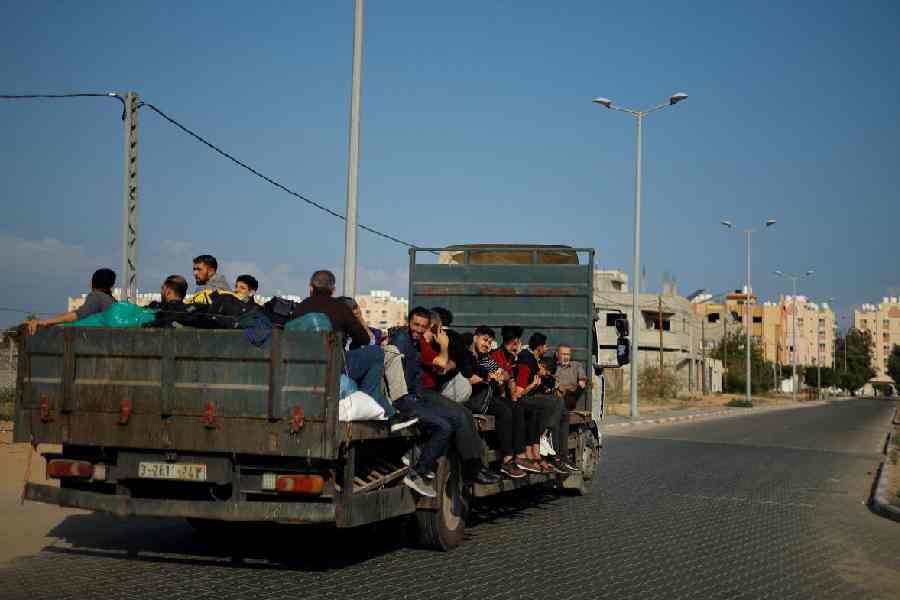The Israeli military said on Sunday it would continue to allow Gazans to evacuate south and hundreds of thousands had already moved, as its troops readied for a ground assault on the Hamas-controlled Gaza Strip in retaliation for unprecedented attacks.
Israel has vowed to annihilate the militant group Hamas after its fighters rampaged through Israeli towns shooting men, women and children and seizing hostages in the worst attack on civilians in the country’s history.
Some 1,300 people were killed in the unexpected onslaught, and graphic mobile phone video footage and reports from medical and emergency services of atrocities in the overrun towns and kibbutzes deepened Israel’s sense of shock.
Israel responded by subjecting Gaza to the most intense bombardment it has ever seen, putting the small enclave, home to 2.3 million Palestinians, under total siege and destroying much of its infrastructure.
Gaza authorities said more than 2,300 people had been killed, a quarter of them children, and nearly 10,000 wounded. Rescue workers searched desperately for survivors of nighttime air raids. One million people had reportedly left their homes.
U.S. Secretary of State Antony Blinken is in the region seeking to secure the release of 126 hostages Israel says were taken by Hamas back into Gaza, and prevent the war from spreading.
Blinken said he had a “very productive” meeting with Saudi Crown Prince Mohammed bin Salman in Riyadh on Sunday and was due to travel later to Egypt, whose Rafa crossing is now seen as the main gateway for aid to reach Gaza.
The violence in Gaza has been accompanied by the deadliest clashes at Israel’s northern border with Lebanon since 2006, raising fears of war spreading to another front.
Israel’s regional foe Iran, which backs Hamas, has lauded the Hamas attack on Israel but has denied any involvement. Its UN mission said late on Saturday that if Israel’s “war crimes and genocide” were not halted immediately, “the situation could spiral out of control” and have far-reaching consequences.
Hamas said in a statement it and Iran had “agreed to continue co-operation” to achieve the group’s goals.
Israel’s Prime Minister Benjamin Netanyahu’s national security adviser on Saturday warned Lebanon’s militant group Hezbollah, also supported by Iran, not to take action that could lead to Lebanon’s “destruction”.
Clashes on Israel’s border with Lebanon, which have been limited so far, resumed on Sunday when Hezbollah fighters launched a missile at an Israeli border village, killing one person and wounding three others. The Israeli military said it was striking in Lebanon in retaliation.
Syria, which also borders Israel and has ties to Iran, has accused Israel of carrying out strikes against its airports, while Israel has accused Iran of trying to smuggle weapons through Syria.
STRUGGLE TO LEAVE
Amid the diplomatic efforts to contain the war, conditions inside Gaza – where water, power and medical supplies have been cut – continued to deteriorate.
The Palestinian Health Ministry said early on Sunday that 300 people, mostly children and women, had been killed, and 800 more had been injured in Gaza during the last 24 hours.
The only route out of Gaza not under Israeli control was a checkpoint with Egypt at Rafah.
Egypt officially says its side is open, but traffic has been halted for days because of Israeli strikes. Egyptian security sources said the Egyptian side was being reinforced and Cairo had no intention of accepting a mass influx of refugees.
On Friday, the Israeli military told residents of the northern half of the Gaza Strip, which includes the enclave’s biggest settlement, Gaza City, to move south immediately.
On Saturday, it said it would guarantee the safety of Palestinians fleeing on two main roads until 4 p.m. (1300 GMT). On Sunday, it said it would continue to allow Gazans to evacuate south, and hundreds of thousands had done so.
Hamas has told people not to leave, saying roads out were unsafe. It said dozens of people had been killed in strikes on cars and trucks carrying refugees on Friday. Reuters could not independently verify this claim.
“We couldn’t leave. They said leave toward the south, but there is no transportation… There was a traffic jam. Some cars got bombed by air strikes. During the night, the children hug me and start to cry and scream saying: ‘Save us, Save us’. How can we save them?,” said Gaza resident Fadi Daloul, who was sheltering with his family in a school.
Some Gazans vowed to stay, remembering the “Nakba,” or “catastrophe,” when many Palestinians were forced from their homes during the 1948 war that accompanied Israel’s creation.
Israel says Hamas is preventing people from leaving in order to use them as human shields, which Hamas denies.










